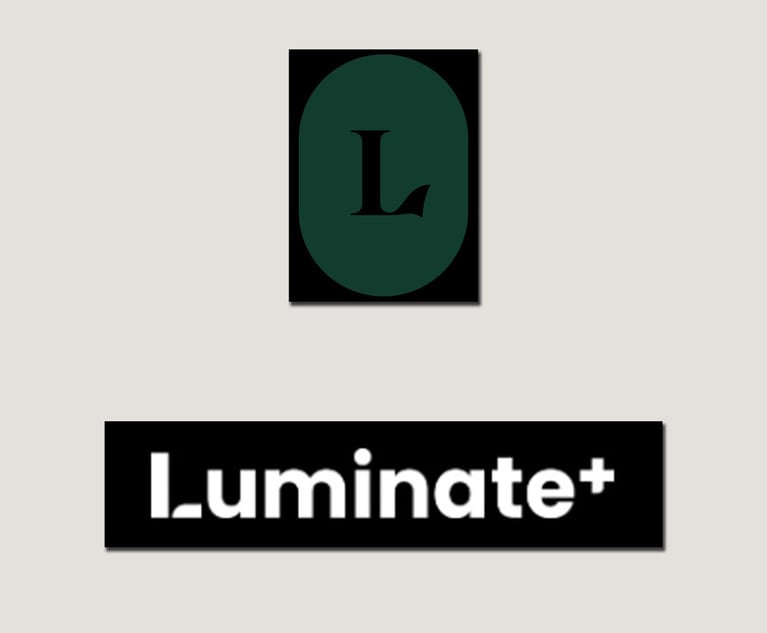8 important in-house compensation statistics
An overview of in-house lawyers' average base salaries, raises, top-paying practice areas and more
December 20, 2012 at 07:00 PM
8 minute read

Want to know what the average GC is earning these days? Interested to know what the top-paying practice areas are? Read on to view data outlining the current in-house compensation climate and see how you stack up.
For more insight on earnings and jobs, read InsideCounsel's 2013 in-house compensation report.

According to HBR Consulting's 2012 HBR Law Department Survey, which reports on data from 2010 and 2011, compensation among in-house lawyers is on the upswing.
CLOs and GCs earned average base salaries of $521,238 and $427,402, respectively.

HBR Consulting's 2012 HBR Law Department Survey found that the average base salary increase among all legal department staff levels was 3.4 percent, up from an average increase of 3.3 percent that companies reported in the 2011 survey.
CLOs saw the highest average base salary increase at 5 percent, with GCs right behind at 4.8 percent.
“We're not seeing dramatic increases in base salary, but the increase we did see this year is very positive, considering where we were two years ago,” says Lauren Chung, senior director and survey editor at HBR Consulting.

Vanessa Vidal, president of ESQ Recruiting, says part of the reason there has been a steady increase in compensation is because in-house counsel are striving to prove their worth to their companies.
“When they can show true value, either in actual dollar amounts with cost reduction or efficiency by improving processes, then their roles are much more appreciated, and they can leverage that in demanding compensation that reflects those efforts.”

HBR Consulting's survey found that the five top-paying practice areas, based on average total cash compensation, are antitrust/trade regulation, intellectual property (licensing), mergers and acquisitions, government relations, and companywide compliance.
Additionally, 39 percent of respondents to HBR Consulting's survey said they planned to increase the number of specialist roles for specific practice areas in the next year.

Bonus levels are similar to those that companies reported in HBR Consulting's 2011 survey. CLOs saw an average cash bonus of $518,035, which is a 5.1 percent increase. GCs saw an average cash bonus of $316,726. Although the amount is a 4.5 percent decrease from the astounding 18.3 percent jump companies reported in the 2011 survey, GCs still are seeing an increase compared with years past. The average cash bonus for all attorney levels was $62,465, a 3.4 percent increase.

Lauren Chung, senior director and survey editor at HBR Consulting says respondents to HBR Consulting's survey said they are dishing out a combination of deferred cash, stock options, restrictive stock and other types of company-specific long-term incentive plans.

According to HBR Consulting's survey, the average total value of long-term incentives that CLOs earned was $913,511, which made up 42.9 percent of their total compensation. GCs' average long-term incentive value was $805,540, which accounted for 41.7 percent of their total compensation. Attorneys across all levels saw an average long-term incentive value of $93,039, which amounted to 19.1 percent of their total compensation.

Despite the fact that many law school graduates still face a bleak legal job market, hiring—albeit selective—is on the rise.
“In-house hiring is robust for the first time in several years,” says Mike Evers, president of recruiting company Evers Legal Search Inc. “When it comes to headcount growth generally, it's simply because the current in-house staff is maxed out. Options come down to adding nontraditional individuals, such as contract attorneys, sending more work to outside counsel or actually hiring. Companies are dabbling with all of those solutions, but thankfully we are at a place now where a number of companies are growing their law departments strategically and slowly.”

Want to know what the average GC is earning these days? Interested to know what the top-paying practice areas are? Read on to view data outlining the current in-house compensation climate and see how you stack up.
For more insight on earnings and jobs, read InsideCounsel's 2013 in-house compensation report.

According to HBR Consulting's 2012 HBR Law Department Survey, which reports on data from 2010 and 2011, compensation among in-house lawyers is on the upswing.
CLOs and GCs earned average base salaries of $521,238 and $427,402, respectively.

HBR Consulting's 2012 HBR Law Department Survey found that the average base salary increase among all legal department staff levels was 3.4 percent, up from an average increase of 3.3 percent that companies reported in the 2011 survey.
CLOs saw the highest average base salary increase at 5 percent, with GCs right behind at 4.8 percent.
“We're not seeing dramatic increases in base salary, but the increase we did see this year is very positive, considering where we were two years ago,” says Lauren Chung, senior director and survey editor at HBR Consulting.

Vanessa Vidal, president of ESQ Recruiting, says part of the reason there has been a steady increase in compensation is because in-house counsel are striving to prove their worth to their companies.
“When they can show true value, either in actual dollar amounts with cost reduction or efficiency by improving processes, then their roles are much more appreciated, and they can leverage that in demanding compensation that reflects those efforts.”

HBR Consulting's survey found that the five top-paying practice areas, based on average total cash compensation, are antitrust/trade regulation, intellectual property (licensing), mergers and acquisitions, government relations, and companywide compliance.
Additionally, 39 percent of respondents to HBR Consulting's survey said they planned to increase the number of specialist roles for specific practice areas in the next year.

Bonus levels are similar to those that companies reported in HBR Consulting's 2011 survey. CLOs saw an average cash bonus of $518,035, which is a 5.1 percent increase. GCs saw an average cash bonus of $316,726. Although the amount is a 4.5 percent decrease from the astounding 18.3 percent jump companies reported in the 2011 survey, GCs still are seeing an increase compared with years past. The average cash bonus for all attorney levels was $62,465, a 3.4 percent increase.

Lauren Chung, senior director and survey editor at HBR Consulting says respondents to HBR Consulting's survey said they are dishing out a combination of deferred cash, stock options, restrictive stock and other types of company-specific long-term incentive plans.

According to HBR Consulting's survey, the average total value of long-term incentives that CLOs earned was $913,511, which made up 42.9 percent of their total compensation. GCs' average long-term incentive value was $805,540, which accounted for 41.7 percent of their total compensation. Attorneys across all levels saw an average long-term incentive value of $93,039, which amounted to 19.1 percent of their total compensation.

Despite the fact that many law school graduates still face a bleak legal job market, hiring—albeit selective—is on the rise.
“In-house hiring is robust for the first time in several years,” says Mike Evers, president of recruiting company Evers Legal Search Inc. “When it comes to headcount growth generally, it's simply because the current in-house staff is maxed out. Options come down to adding nontraditional individuals, such as contract attorneys, sending more work to outside counsel or actually hiring. Companies are dabbling with all of those solutions, but thankfully we are at a place now where a number of companies are growing their law departments strategically and slowly.”
This content has been archived. It is available through our partners, LexisNexis® and Bloomberg Law.
To view this content, please continue to their sites.
Not a Lexis Subscriber?
Subscribe Now
Not a Bloomberg Law Subscriber?
Subscribe Now
NOT FOR REPRINT
© 2025 ALM Global, LLC, All Rights Reserved. Request academic re-use from www.copyright.com. All other uses, submit a request to [email protected]. For more information visit Asset & Logo Licensing.
You Might Like
View All
Global Software Firm Trying to Jump-Start Growth Hands CLO Post to 3-Time Legal Chief

In-House Legal Network The L Suite Acquires Legal E-Learning Platform Luminate+

John Deere Annual Meeting Offers Peek Into DEI Strife That Looms for Companies Nationwide
7 minute read
Antitrust in Trump 2.0: Expect Gap Filling from State Attorneys General
6 minute readTrending Stories
- 1Who Are the Judges Assigned to Challenges to Trump’s Birthright Citizenship Order?
- 2Litigators of the Week: A Directed Verdict Win for Cisco in a West Texas Patent Case
- 3Litigator of the Week Runners-Up and Shout-Outs
- 4Womble Bond Becomes First Firm in UK to Roll Out AI Tool Firmwide
- 5Will a Market Dominated by Small- to Mid-Cap Deals Give Rise to a Dark Horse US Firm in China?
Who Got The Work
J. Brugh Lower of Gibbons has entered an appearance for industrial equipment supplier Devco Corporation in a pending trademark infringement lawsuit. The suit, accusing the defendant of selling knock-off Graco products, was filed Dec. 18 in New Jersey District Court by Rivkin Radler on behalf of Graco Inc. and Graco Minnesota. The case, assigned to U.S. District Judge Zahid N. Quraishi, is 3:24-cv-11294, Graco Inc. et al v. Devco Corporation.
Who Got The Work
Rebecca Maller-Stein and Kent A. Yalowitz of Arnold & Porter Kaye Scholer have entered their appearances for Hanaco Venture Capital and its executives, Lior Prosor and David Frankel, in a pending securities lawsuit. The action, filed on Dec. 24 in New York Southern District Court by Zell, Aron & Co. on behalf of Goldeneye Advisors, accuses the defendants of negligently and fraudulently managing the plaintiff's $1 million investment. The case, assigned to U.S. District Judge Vernon S. Broderick, is 1:24-cv-09918, Goldeneye Advisors, LLC v. Hanaco Venture Capital, Ltd. et al.
Who Got The Work
Attorneys from A&O Shearman has stepped in as defense counsel for Toronto-Dominion Bank and other defendants in a pending securities class action. The suit, filed Dec. 11 in New York Southern District Court by Bleichmar Fonti & Auld, accuses the defendants of concealing the bank's 'pervasive' deficiencies in regards to its compliance with the Bank Secrecy Act and the quality of its anti-money laundering controls. The case, assigned to U.S. District Judge Arun Subramanian, is 1:24-cv-09445, Gonzalez v. The Toronto-Dominion Bank et al.
Who Got The Work
Crown Castle International, a Pennsylvania company providing shared communications infrastructure, has turned to Luke D. Wolf of Gordon Rees Scully Mansukhani to fend off a pending breach-of-contract lawsuit. The court action, filed Nov. 25 in Michigan Eastern District Court by Hooper Hathaway PC on behalf of The Town Residences LLC, accuses Crown Castle of failing to transfer approximately $30,000 in utility payments from T-Mobile in breach of a roof-top lease and assignment agreement. The case, assigned to U.S. District Judge Susan K. Declercq, is 2:24-cv-13131, The Town Residences LLC v. T-Mobile US, Inc. et al.
Who Got The Work
Wilfred P. Coronato and Daniel M. Schwartz of McCarter & English have stepped in as defense counsel to Electrolux Home Products Inc. in a pending product liability lawsuit. The court action, filed Nov. 26 in New York Eastern District Court by Poulos Lopiccolo PC and Nagel Rice LLP on behalf of David Stern, alleges that the defendant's refrigerators’ drawers and shelving repeatedly break and fall apart within months after purchase. The case, assigned to U.S. District Judge Joan M. Azrack, is 2:24-cv-08204, Stern v. Electrolux Home Products, Inc.
Featured Firms
Law Offices of Gary Martin Hays & Associates, P.C.
(470) 294-1674
Law Offices of Mark E. Salomone
(857) 444-6468
Smith & Hassler
(713) 739-1250






